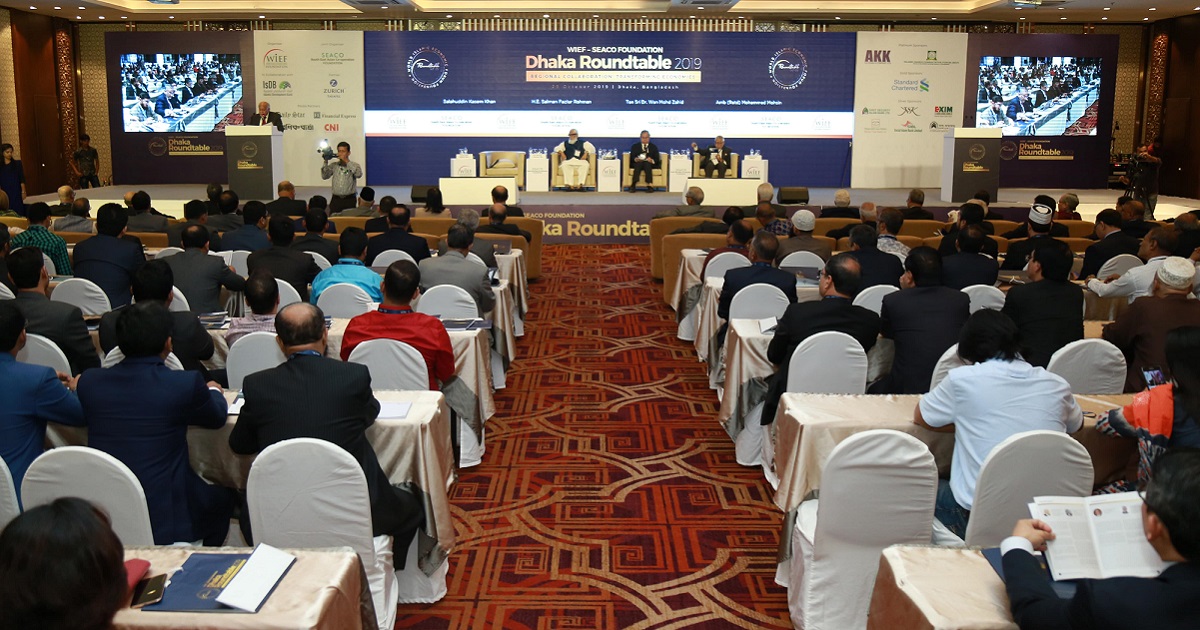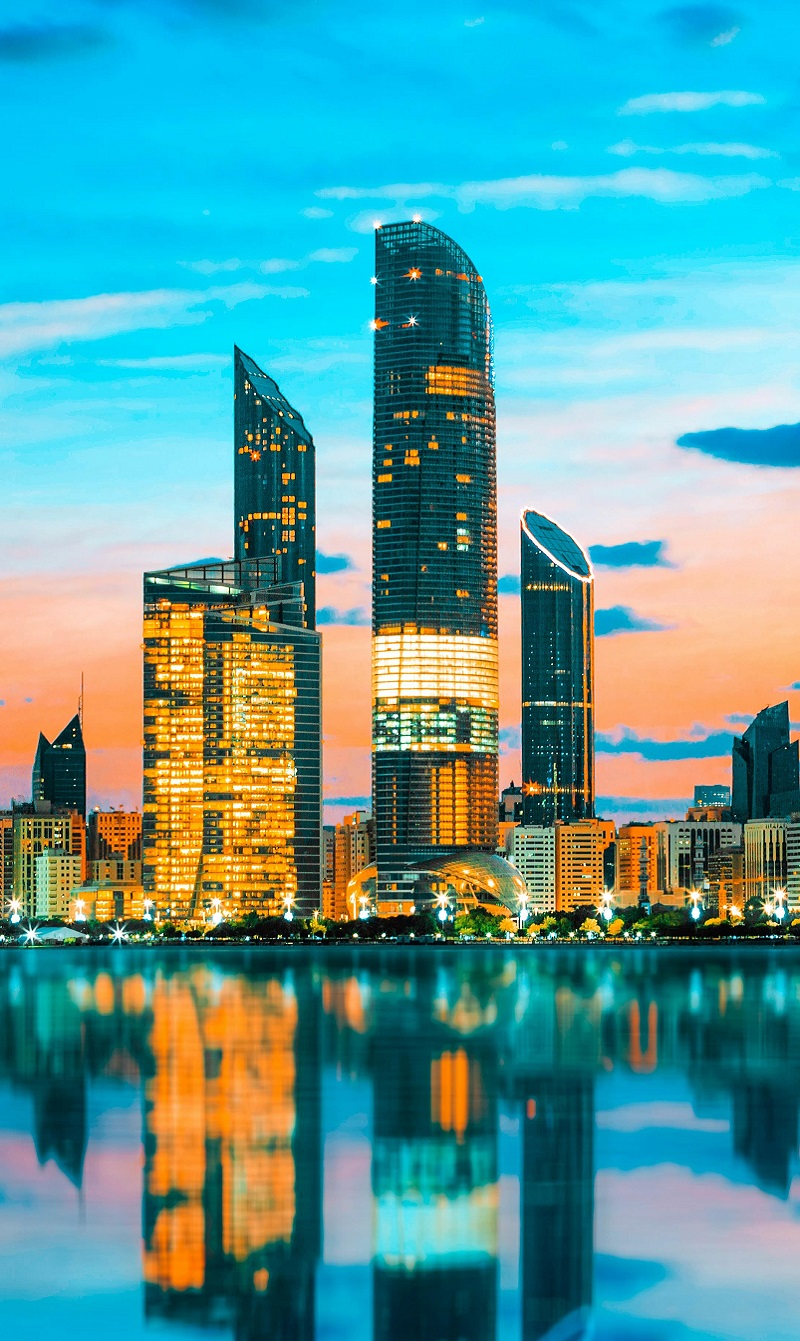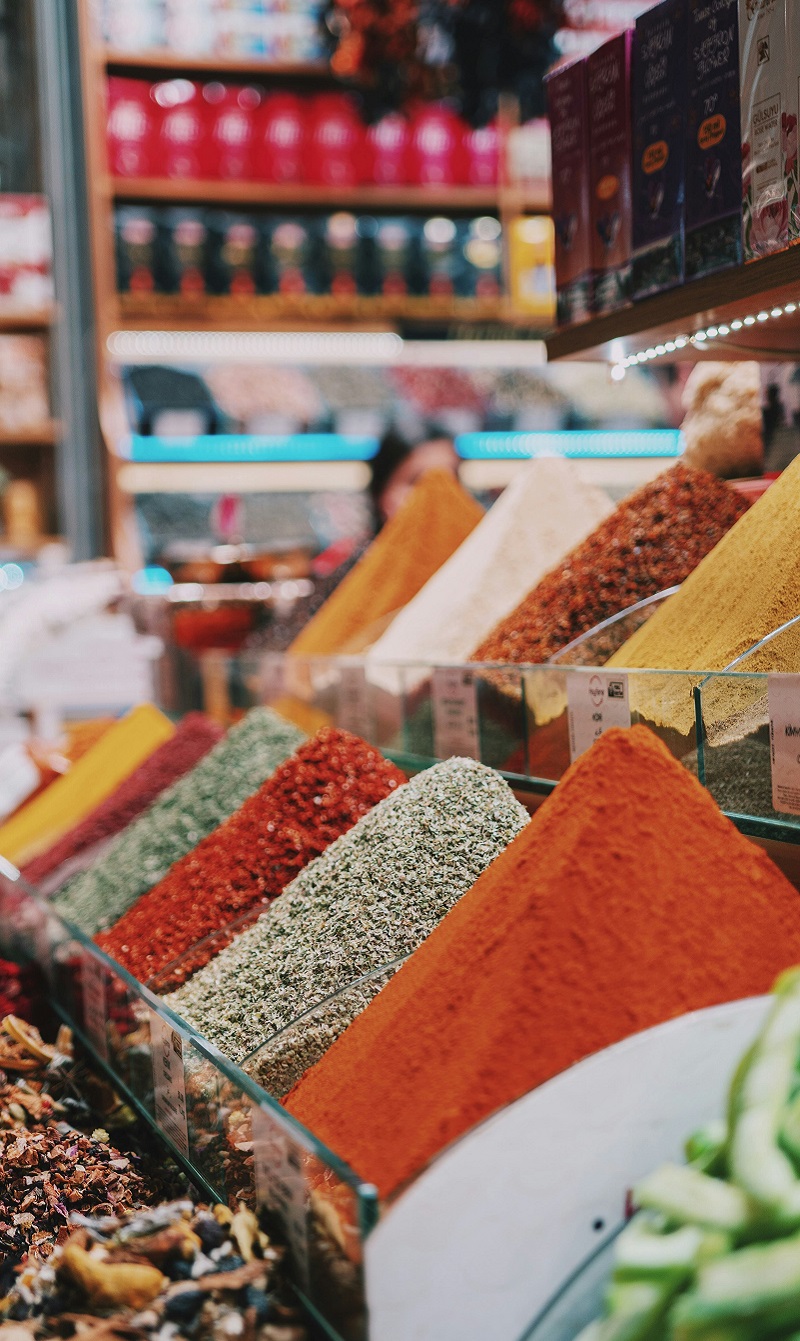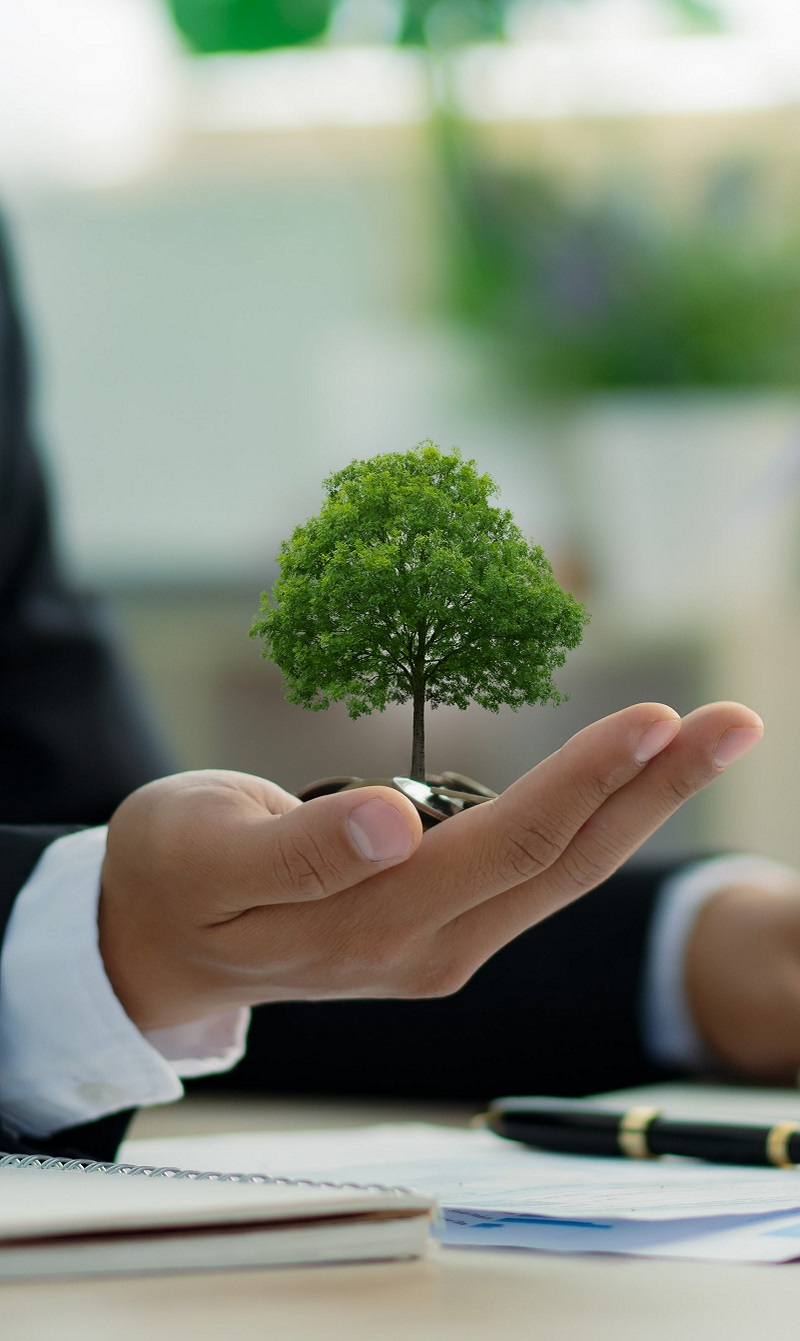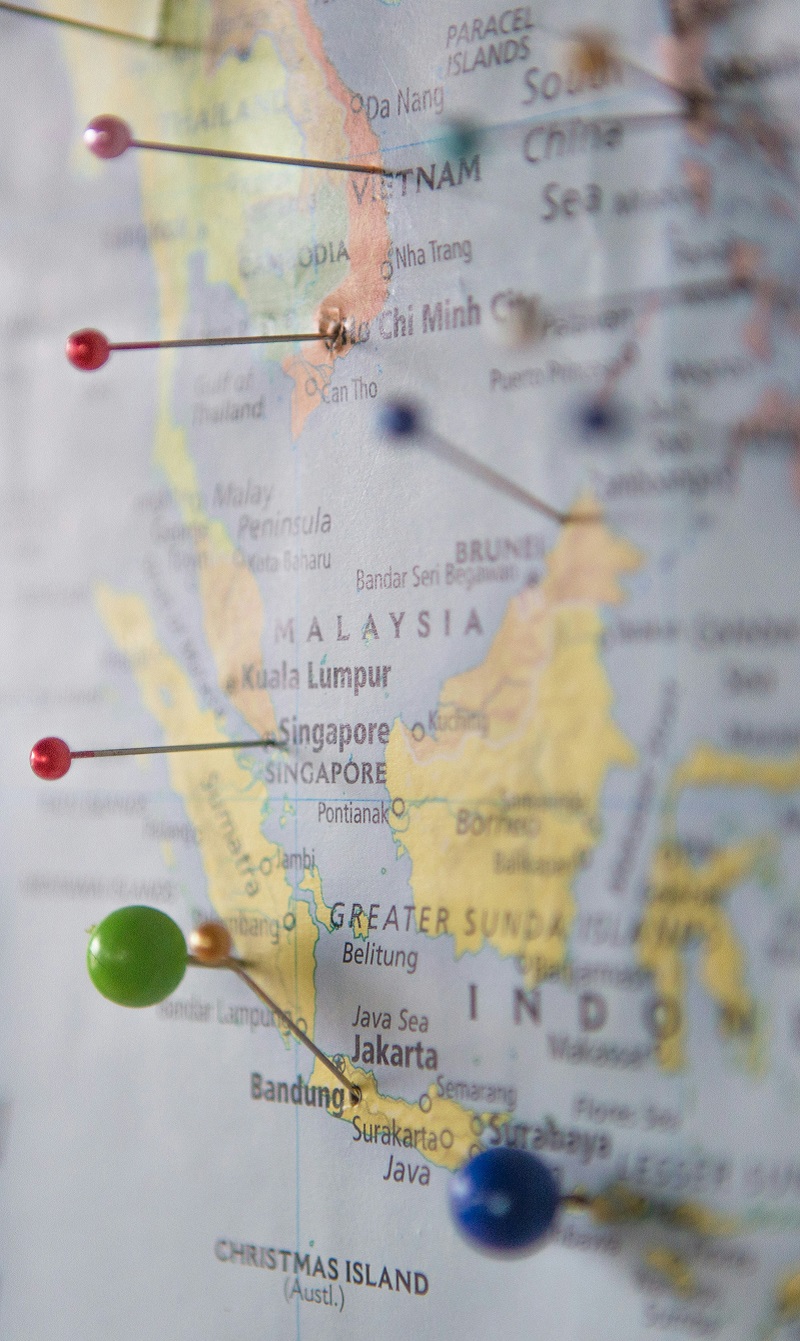Accelerating Regional Cooperation
Here are highlights from the opening, closing and the last of four sessions during WIEF-SEACO Foundation Roundtable 2019 in Dhaka which showcases SEACO as a vehicle that drives regional cooperation. The other three sessions of the Roundtable discusses Islamic finance, halal in the digital age and rethinking infrastructure development.
‘WIEF and SEACO Foundation Bangladesh have been working to foster close business ties and cooperation across private sectors among five OIC member countries in South and Southeast Asia namely, Bangladesh, Brunei Darussalam, Indonesia, Malaysia and the Maldives. Our government has been promoting regional cooperation and closely associate it with the ideas and ideational frontiers of the WIEF and SEACO for over the last two decades,’ reads the message from the Prime Minister of Bangladesh Sheikh Hasina.
On the morning of 29 October 2019, at Radisson Blu Dhaka Water Garden in Dhaka, WIEF-SEACO Foundation Roundtable begins with an introductory speech by SEACO Foundation’s Executive Chairman, Salahuddin Kasem Khan. Following that, is a speech by the Chairman of WIEF Foundation, read by Chairman of WET initiative of WIEF Foundation Tan Sri Dr Wan Mohd Zahid.
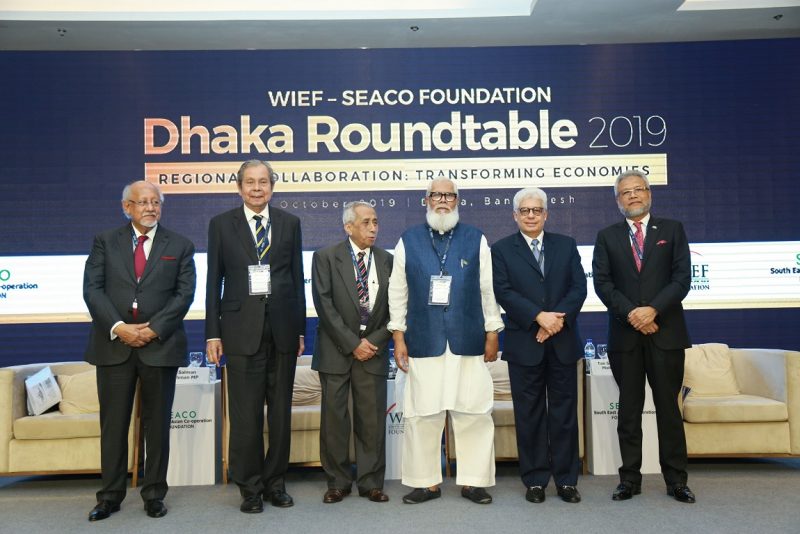
Summary of the Executive Chairman of SEACO’s Introductory Speech
The gist of it is that Bangladesh needs to look beyond its existing economic partners to ensure its national development plans are on track. It’s in the process of establishing 100 special economic zone, about a dozen of them are already with four allotments to three countries, Japan, China and India.
Bangladesh’s strategic location provides tremendous potential for being the economic hub of the region: India on the west, China to the north and Southeast Asia on the east, Bangladesh is in the middle of a combined market of four billion people. Bangladesh also wants to export products to the northeast Indian states and Southeast Asia, taking advantage of the improved connectivity between them.
Bangladesh’s potential with a large population, mostly young people under the age of 25 are ready to be engaged at very competitive wages and burgeoning growth of the middle class indicate a market potential for investors. During the last decade, its GDP growth averaged seven per cent, reaching 8.1 per cent last year (2018) and expecting to be 8.2 in the current fiscal year. Today, Bangladesh is a USD300-billion economy. Currently, it’s importing LNG from Qatar and Oman in two floating LNG terminals in Moheshkhali in the Bay of Bengal.
Bangladesh expresses a hope that gas-rich Brunei will be a member of SEACO and will be interested to supply LNG to the country amid its growing natural gas demand, looking at the rapid urbanisation happening in the country. The path of an economic progress dictates that Bangladesh opens the energy supply doors all around.
In terms of collaborations, Bangladesh and Indonesia have agreed to boost cooperation in different sectors including trade, diplomacy, fishing and energy last year (2018) but the balance of trade between the two countries is now tilting in favour of Indonesia. A high-powered Indonesian government delegation will visit Bangladesh in 2030 for the third round of Indonesia-Bangladesh Preferential Trade Agreement.
Also, Bangladesh plans to form a committee to negotiate the FTA with Malaysia. At the recent NAM Summit in Baku, the Malaysian Prime Minister mentioned to the Bangladesh Prime Minister that Malaysian investment to Bangladesh will increase as relations between the two countries are deeply rooted and Malaysia will try to take in more manpower from Bangladesh.
Lastly, the final session of this roundtable will introduce SEACO as a regional platform. SEACO could well be considered a strategic initiative for the OIC countries, South Asia and Southeast Asia, leveraging on SEACO’s unique position as a bridge linking South Asia and Southeast Asia. Economic integration of this region could bring not only enhanced economic dividends but also promote greater political concert of these countries. It’s acknowledged that regional cooperation is key to a resilient as well as sustainable economic integration and strengthen cooperation globally. A cohesive regional engagement like SEACO could well provide a stronger voice in the international arena. The WIEF-SEACO Roundtable 2019 is an outcome of this strategic roadmap for the region in the Bay of Bengal. We want to make this event focused, action-oriented with concrete outcomes.
Summary of the Chairman of WIEF Foundation’s Speech
Regional collaboration has become increasingly important in enabling individual states to address cross-border issues that cannot be otherwise resolved on their own. Regional collaboration could be an important determinant in harmonising the national resilience and indeed, the process of national economic development, the transformation can be better achieved within the benefits of regional cooperation.
The organisational structure and the legal framework established by organisations, either regional or international, and accompanied by specific programmes, have been instrumental in allowing enhanced collaboration to take place. The success of these organisations enables them to shape their own regional identity and pride of their own citizens.
Muslim countries have benefitted by being members of geographically fixed based organisations like the OIC, of which eight members subsequently took the initiative to establish smaller grouping of the member states and formed D-8. The establishment of additional subgroupings can benefit their own countries and this is the context in which the establishment of SEACO by Bangladesh is commended. Bangladesh has made a good start by setting up SEACO Foundation in Dhaka to proceed with this initiative, which is in line with the inspiration of its Prime Minister Sheikh Hasina.
Finally, the implementation of tactical programmes in provision of adequate resources, good rapport between private sectors and member countries can ensure progress to be achieved on a step-by-step basis.
Last Session of the Roundtable
SEACO comprises five countries, begins session moderator, Md. Abdul Karim who is a senior adviser of Building Resources Across Communities (BRAC). The organisation, he continues, ‘represents a region of 2.3 million square kilometres with a combined GDP of USD1.5 trillion and trade volume of USD770 billion in which the GDP growth is on the average of five to six per cent’, as well as a workforce of 194 million. All these figures point toward limitless cooperation, should there be cooperation among the SEACO member countries.
About SEACO by its Executive Chairman
Salahuddin Kasem Khan, Executive Chairman of SEACO Foundation and a member of WIEF Foundation’s International Advisory Panel, explains that in response to these global economic and trade challenges, the Prime Minister of Bangladesh raised the initiative of SEACO. The good news is that Bangladesh is in the process of formalising PTA (preferential trade agreement) with Indonesia and negotiating an FTA (free trade agreement) with Malaysia. The idea of a Southeast Asian Co-operation came from OIC’s focus and discourse on regional economic integration reflected in a number of OIC conferences and OIC Summit since 1990s.
Other regional organisations for economic cooperation like the Arab Maghreb Union, Gulf Cooperation Council, Arab Cooperation Council and Arab Common Market also had similar objectives. There exists no regional organisations nor platforms for economic cooperation involving five geographically disjointed OIC member states of Bangladesh, Brunei, Indonesia, Malaysia and Maldives. SEACO filled the void and received endorsement in many fora. It was first proposed at the Indonesia IDB High Technology Seminar held in Bandung in 1992.
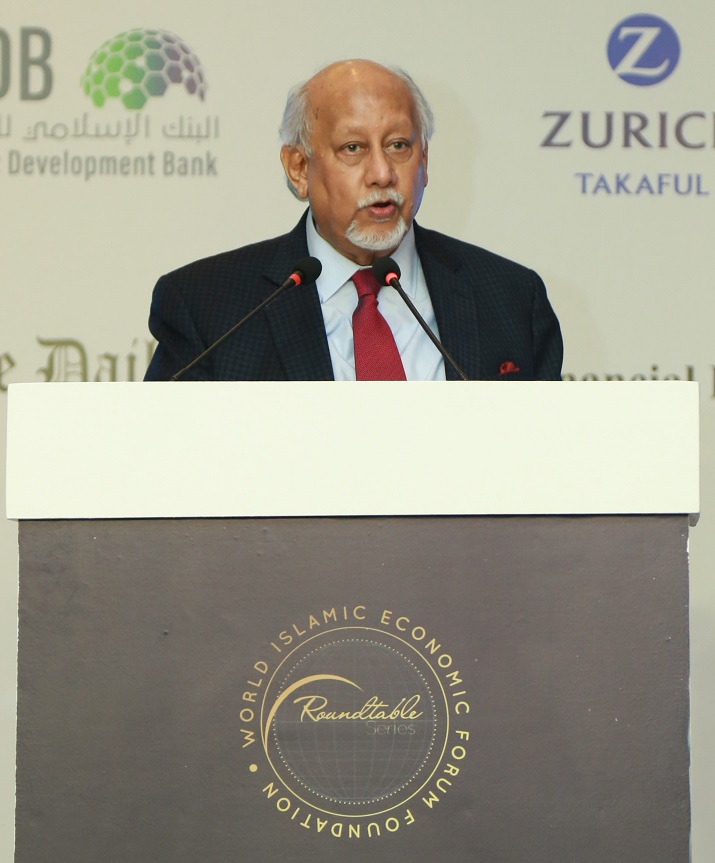
SEACO’s early milestones include its endorsement by resolution of the 9th Islamic Summit in Doha in 2000. In that same year, it entered into official talks between the Prime Ministers of Bangladesh and Malaysia while in 2004, it was an important agenda item in the first Bangladesh Malaysia Business Forum where Tun Dr Mahathir Mohamad was the keynote speaker.
SEACO with the combined consumer stand of over 450 million, envisions itself as a private sector-led initiative with the government providing relevant policy support, instruction and guidance. The private sector as a major stakeholder in this initiative, SEACO acts as a bridge among the private sector trade bodies of its member countries to explore new areas of cooperation, partnership, joint venture investment and business. What’s more, it acts as a forum where business communities share their expertise and technology, forging stronger digital connection and expanding business horizons. Essentially, SEACO acts as a negotiation and bargaining platform for the trade and investment bodies of the OIC member countries.
While a SEACO task force was set up in Dhaka in 1994, a Malaysian SEACO task force was set up in 2010 and discussions are underway for the next task force to be set up in Brunei. Hopefully, it’ll be followed by Indonesia and Maldives with the remaining member countries following suit. There are possibilities for a SEACO Business Council and a SEACO economic forum, among others. Looking at the economic growth potential of Bangladesh and Indonesia in the near future, shows that this is a strategic region and economic integration of this region would bring about not only enhanced economic dividends but also greater political concert of the involved countries.
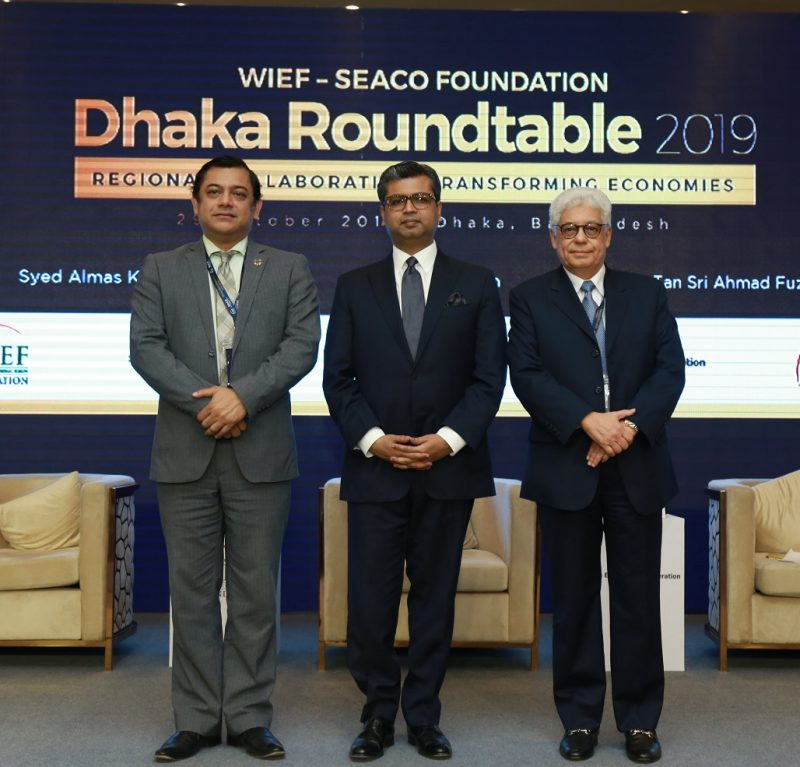
Closing Session of the Roundtable
The closing session of the one-day Roundtable sees Sheikh Fazle Fahim of Federation of Bangladesh Chambers of Commerce and Industries (FBCCI), Tan Sri Ahmad Fuzi Hj Abdul Razak of WIEF Foundation and Syed Almas Kabir from BASIS Bangladesh who summarises the four sessions of the Roundtable. A video presentation by FBCCI gives the big picture of Bangladesh and the direction it’s heading towards.
Tan Sri Ahmad Fuzi articulates during the final speech of the Roundtable, how the presentations during the sessions are constructive, informative and inspiring. Various points of view and questions are good reference points for the participants. ‘I believe, the roundtable is successful in providing a platform to encourage collaboration on specific areas covering infrastructure development, Islamic finance and halal industry within the region. I also believe that participants have now a better understanding of the concept of SEACO and its potential,’ concludes Tan Sri Ahmad Fuzi.
For details on the Roundtable programme and bio of each speaker, visit event webpage. To read summaries of the Roundtable sessions, visit: Rethinking Infrastructure Development, Islamic Finance and Halal in the Tech Age.
